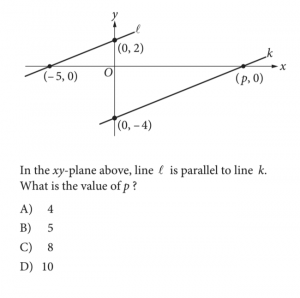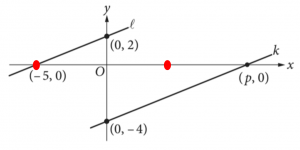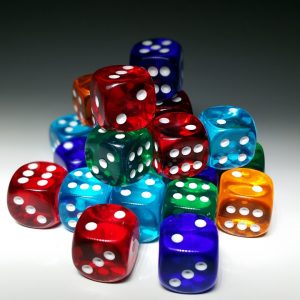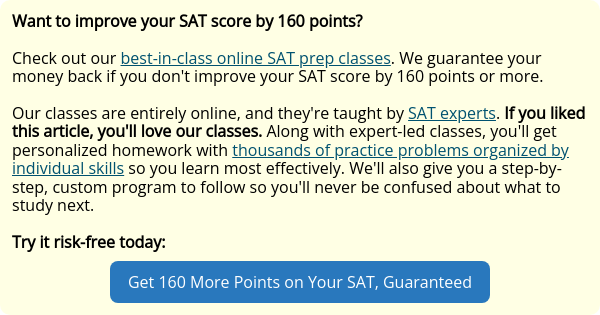
No doubt you’ve heard one piece of advice more than any other when it comes to test-taking: “If you need to guess on a multiple choice test, always pick C.”
But is the popularity of this strategy an indication of its efficacy? Do you have a better chance at gaining points if you guess C on your SAT questions in comparison to any other guessing strategy? And if not, what can you do to improve your odds when guessing?
Let’s look at the facts.
Why You Should Answer Every Question on the SAT
First things first: the old SAT is dead and gone, and so is any guessing penalty. You will not be penalized for getting a wrong answer on the SAT, so make sure to never leave a question blank!
For every correct answer you choose, you’ll earn one point, and for every blank or wrong answer, you’ll earn zero points. If you don't know an answer and guess it wrong, you'll gain the same number of points that you would have had you left it blank (zero). And if you guess the question right, you'll earn yourself one point!
Of course, guessing is still a last resort, since it’s always better to try to find the correct answer first whenever possible. But sometimes you’ll have no choice but to guess and that's where guessing strategy is key.
There are two main types of guessing—educated guessing and blind guessing—and you’ll have to figure out which one to use based on the situation you find yourself in.
So let's break down how and when to go about making each type of guess.
Educated Guessing
An educated guess is a guess based on some amount of reason and understanding, whether it be large or small. Typically, an educated guess means you’re able to eliminate one or more answer options or estimate a reasonable ballpark range in which the correct answer can lie.
For instance, you can make an educated guess if you:
- Understand the gist of a question, but don't have the time to work through it completely
- Understand parts of a question, but don’t quite know how to work through it completely
- Are torn between a few answer options, but have some idea of what the answer can or can’t be
For example, let's look at an SAT math problem:

If you're not familiar with either the coordinate plane or slopes, or you just don't think you can solve this problem for any reason, then you can at least make an educated guess and increase your chances of picking the correct answer. It's all too easy to panic and choose an obviously wrong answer when you're taking a marathon test like the SAT, so try to take a beat and think strategically before you fill in a bubble.
In a geometry problem like this, figures will generally be drawn to scale unless there's a specific line of text that says otherwise. If you know that coordinates are written as (x, y), then you know that p represents the value along the x-axis. (And if you didn't know this, then you can still infer it by seeing that the point (p, 0) has a rise of 0, which means that p must be the value along the x-axis, not the y-axis.)
You can immediately eliminate answer choices A and B, since they will be too small to equal p. Why? If you eyeball where the -5 is along the x-axis and place a rough approximate at the opposite side on +5, you'll see why you can cross off A and B straight away.

C or D must be the correct answer because they are the only answer options where p is greater than 5. And, since the estimated location for +5 looks about halfway between 0 and p, D is probably the best guess between the two options.
[Spoiler: D is totally the right answer]
Blind Guessing
The second category of guesswork is blind guessing, which is a guess based more on chance than on reason.
It's time to make a blind guess if you:
- Come up against a question and have absolutely no clue where to begin
- Are about to run out of time and still have questions left to answer
If you can’t eliminate any answer options (or don’t even have the time to read the question), you just have to fill in an answer bubble and keep going. Leaving a question blank is tantamount to throwing your points away, so you may as well fill in something.
But when you have to make a blind guess like this (or multiple blind guesses), are you better off choosing C than any other answer choice? Let's see.
 Having a strategy makes any journey easier, and it's no exception for the SAT
Having a strategy makes any journey easier, and it's no exception for the SATFact or Fiction: Is C the Most Common Answer on the SAT?
If it were true that you're better off choosing C than any other letter, it would mean that correct answer choices weren't randomly assigned. After all, if the answer keys were randomized, why should C be any more likely to be the right answer than any other letter option?
Now, true randomization will depend on the type of test in question. Some of your high school teachers likely design their tests by hand, which means that their answer keys will not be statistically random. No matter how much your teachers may try to randomize their choices, human beings are NOT random and cannot properly randomize a series. For instance, a truly random sampling will actually produce bizarre strings of patterns—six B’s in a row, or twenty questions without a D—and most people do not (or cannot) create these patterns when they try their best to be “random.”
Fortunately or unfortunately, this is NOT the case on the SAT. Unlike many of the tests you take in high school, SAT answer keys are completely computer generated. And computers are very good at being random. Every answer choice on the SAT will have a statistically even distribution of 1 in 4 for each answer choice letter, A, B, C, or D.
In other words? There is no most common answer on the SAT.
Ultimately, guessing C (or any letter!) will give you the correct answer only a statistical 25% of the time. Which means it's NOT true that choosing C will give you a better rate of success than choosing any other letter for your blind guessing.
What to do, then?
So How Should You Guess?
If C isn't the most common answer on the SAT, then how should you guess? The truth is, that when it comes to making blind guesses, it doesn't matter which letter you pick, only that you stick to the one you choose every time you make a blind guess.
The best strategy, and the one that will maximize your overall point gain, is to pick your favorite letter and fill it in for every blind guess. Whether that letter is A, B, C, or D doesn't matter—just be sure to stick with it every single time.
So, if you like it best, then definitely go right ahead and choose C to be your designated letter! (Just don't expect C to be a better answer choice than A, B, or D.)
But maybe you think that this strategy sounds illogical. Why would you be better off filling in the same letter over and over again instead of doing your best to create a random guess spread? Let’s see.

Why Does Sticking to One Letter Increase Your Odds of Guessing the Right Answer?
Sticking by the same letter for every blind guess won’t increase your chances of getting any one particular question correct, but it will maximize your total point gain potential. Why? Because people aren’t random. If you’re making your own "random" blind guesses in a spread, you’ll almost certainly reduce your overall guessing odds. Your best attempt at random guessing can never replicate computer-generated randomness.
By sticking to your same designated letter when making blind guesses, you are re-introducing an element of randomness and maximizing your chances for success over time.
Let’s see this in action to better demonstrate why this works.
Scenario: you’re down to the wire, and you’ve run out of minutes on the clock. You have 15 questions left and only a few seconds to bubble in your answers. There’s no time to even look at the questions, so now you’ll have to make the best blind guesses you can and figure out how to get as many points as possible before it’s pencils down.
You’re left with two options: make a random guess spread, or fill in every letter with the same answer choice.
Let’s see how each option does when compared to a real SAT answer guide [note: we are using the first 15 answers from the reading section of the 2016 SAT test #1].
(Note: for our random spread, we tried to guess as randomly as we could without looking at the answer key, and for our consistent letter, we simply went with C.)
| “Random” Spread | Consistent Guess (C) | Correct Answers |
| D | C | B |
| A | C | B |
| A | C | C |
| D | C | A |
| C | C | C |
| B | C | D |
| B | C | D |
| B | C | B |
| D | C | C |
| C | C | B |
| D | C | A |
| A | C | B |
| C | C | D |
| B | C | A |
| D | C | A |
By trying our best to guess randomly, we earned 2 points, but by sticking by a consistent choice of C, we earned 3 points (and spared ourselves the effort of trying to be "random").
Again, sticking to the same letter won't work better for each individual question, but on average and over a spread, the strategy will let you maximize your total point-gain.

If you gotta roll the dice anyway, you may as well learn how to do it in your favor
The Take-Aways
Is C the correct answer more often than any other? No. But is it the best letter to choose when you're in a bind and don't know what the right answer choice is? Well, yes and no.
When it comes to making guesses, try to eliminate answer choices whenever possible. But if you can't, and you must make a blind guess, then stick to one letter and run with it every single time. If you want this letter to be C, then go right ahead! Just make sure you stick with it for each and every guess.
C isn't any better or worse than any other letter, or any more likely to be the correct answer, but if you decide to stick with it for every blind guess you make, you'll have a better chance of success than if you try your best to be "random."
What's Next?
You've learned how to make the best possible guess on the SAT when you're in a bind, but remember that eliminating answer choices is always better! Check out our guide to eliminating answer options on the SAT.
Want more SAT practice? We've got all the SATs available online, free and available for you to take as practice.
Not sure what SAT score to aim for? Check out what makes a "good" or "bad" SAT score and how to find the perfect score goal for you.











